Among other things, it was this movie that made me want to become a Freemason.
The Man Who Would Be King is the ultimate buddy movie. John Huston made it in 1975, and by the time he finally did, it had been on his to-do list for 20 years. That it was such a labour of love for him shows in every frame. Everything about it has gravitas, down to the score, which never fails to make me tear up the minute the opening credits begin to roll. Writing about it in one fashion or another has been on my to-do list since I came to the 25YL staff two years ago, and it’s just as much a labour of love for me. I’ve been waiting for an excuse. As of this writing, Sir Sean Connery died two days ago, so there it is. I’m going to do my best to keep focused, and try to, as Peachey Carnehan says, keep my mind from flying off. But I love it a lot, so bear with me.
The Man Who Would Be King is based on the 1888 novella by Rudyard Kipling (of whom John Huston was an enormous fan), himself a Freemason, and who is played in the film by Christopher Plummer. The story is told in flashback, of two friends, Peachey Carnehan and Daniel Dravot, who set off on an impossible adventure, and only one of them returns to tell the tale.
At the very top of the film is a ten minute montage of the marketplace in Lahore. I couldn’t begin to tell you why, since it doesn’t feature any of the actual characters. Maybe Huston thought, well, we’re here in Morocco, let me get as much out of this fantastically colourful location as possible. It certainly sets the tone, and only just begins to demonstrate how many locals this film was able to employ, which is always great.
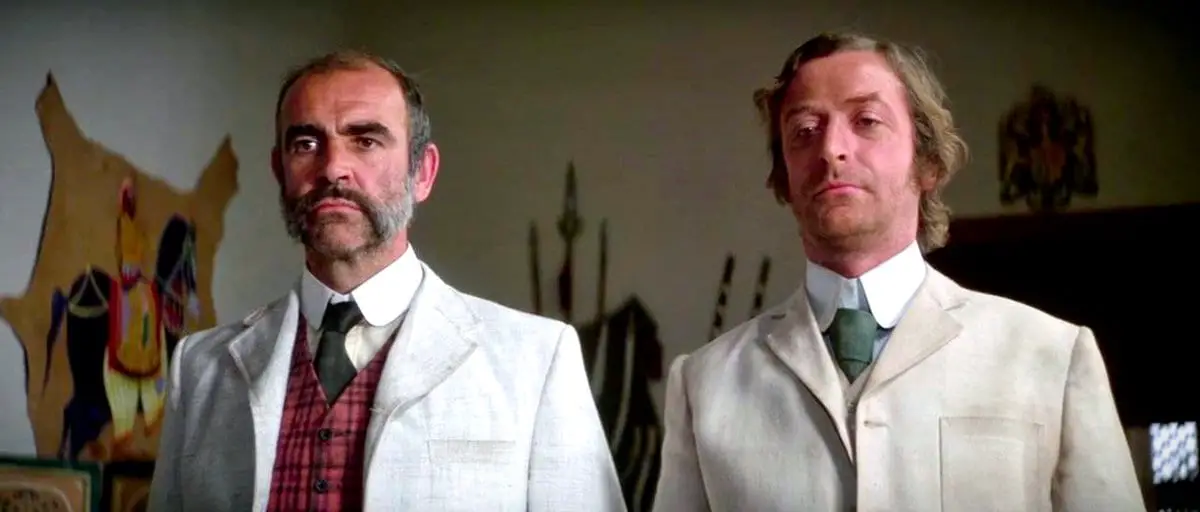
As I said, most of the film is in flashback. The flashback is book-ended by present day scenes in Kipling’s office. A broken man comes in, barely recognizable as Peachey (Sir Michael Caine), and demands a drink. He is alone, as far as we know. Since it’s the beginning of the film, you don’t realize that this is extraordinary, because Peachey is never alone. He isn’t alone now either…only we don’t know that yet. The flashback begins, narrated by Peachey, and we are transported—“three summers and a thousand years ago.”
At the train station in Lahore, Peachey strikes up a conversation with Kipling. When he asks Kipling if he can cut his travel plans short so that he can do him a favour, Kipling naturally says a polite “no” to the man he just met…until Peachey begins to drop certain phrases, including a hope that Kipling will do him this favour “for the sake of the widow’s son.”
When Masonic code words and phrases start being handed back and forth, the entire tone of everything shifts. Not only does the body language of both men change, even the sound of the film becomes clearer, and of course, Kipling agrees without hesitation. For the record, when I mention something Masonic, I’m strictly going off that which is directly given in the film—you’re not getting any secrets out of me (except www.co-masonry.org, you can look there if you want to).
The favour Peachey has asked of Brother Kipling is to deliver a message to Brother Daniel Dravot (Sir Sean Connery), regarding a bit of adjacent business. Danny is glowery and distrustful of the stranger until Kipling says the Magic Words, but then he too is all smiles and handshakes. These guys are old school, idealistic Masons, who would drop anything to help out a Brother. It was one of the things that appealed to me about it, in a world where loyalty and genuine fraternity (and as a Co-Mason, I say that in a non-gender specific way) are at a premium. Back in Lahore, when Kipling has to explain his new friends to his employer (and one of the simpler ways I myself use to describe the concept of Masonry to people), he describes it as “an ancient order dedicated to the proposition of all men being brothers under the all-seeing eye of God”.
The capital P Plot begins a few nights later, when Peachey and Danny show up unannounced in Kipling’s office. They have an idea, they say, and they want Kipling’s help to set it off. “We’re not little men, so we’re going away to be kings.” They plan to journey to the far-off land of Kafiristan, a land not seen by any white man since Alexander the Great. They figure that with their knowledge of soldiering and general savvy (to say nothing of the cache of rifles and ammunition they plan to bring with them), it should be a snap for two such as they to turn a land of warring tribes into one consolidated kingdom, ruled by themselves. They want Brother Kipling’s aid in the venture by way of use of his maps, but mostly to bear witness. They are Freemasons, after all, and they do like ritual—in this case, the witnessing and signing of a Contrack (written in the novella just the way it’s pronounced in the film, bless Caine’s accent).
The Contrack itself is very straightforward, and could be a template for all buddy movies til the end of time. “One, that you and me will settle this matter together, i.e., to be kings of Kafiristan. Two, that you and me will not, while this is being settled, look at any liquor, nor at any woman, black, white or brown, so as to get mixed up with one or the other harmful. Three, that we conduct ourself with dignity and discretion, and if one of us is in trouble, the other one will stay by him.” Peachey, the brains of the outfit (though Danny is no slouch), reads the Contrack aloud, and Danny adds, “there’s no need for the last article, but it’s got a nice ring to it.” How prophetic those words, and indeed, the whole Contrack turn out to be.
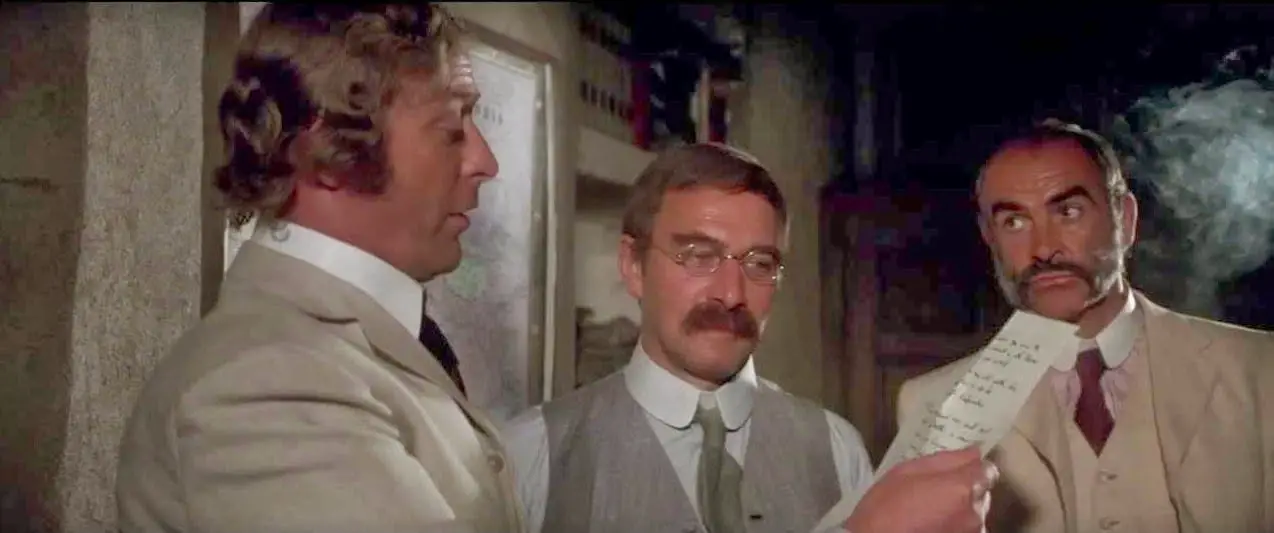
Christopher Plummer is practically baby-faced in 1975, but the Plummer gravitas still shows through, and even though he’s only in the movie at the beginning and the end, his performance isn’t one you easily forget. Connery and Caine had a longtime friendship before this film, and while both are great actors regardless, I think it makes a difference. There’s a comfort with each other, a bro-ship that seems to come to them as easily as breathing, which was probably why Huston wanted them in the first place.
The journey to Kafiristan is epic and amazing. Gorgeous, on-location cinematography, Michael Caine narration, and foreshadowing in the form of Danny loudly singing as they walk up through snow-covered mountains. He is shushed by Peachey, who is concerned about avalanches (Danny thinks that’s an old wives’ tale, and thank goodness he’s proved to be wrong later), and Danny blows him off, saying “if a king can’t sing, then it ain’t worth being king.”
The best scene in the trek across the icy wasteland comes when they think they’re done for. Their path is halted in front of them by a gully they can’t hope to cross, and behind them by a collapse. They find scant shelter, build what fire they can, and keep stalwart. There’s more foreshadowing— “I’d like to have seen you, Danny, with a gold crown on your head.” I can’t blame a man for getting existential when he’s about to freeze to death, and as they wait to die, they examine their lives. “Peachey,” asks Danny. “In your opinion, have our lives been misspent?” And Peachey has no regrets, and quickly disabuses Danny of any of his—“why, even now, I wouldn’t trade places with the Viceroy himself if it meant giving up my memories.”
The mere mention of memories leads them on a jaunt down memory lane, and soon the mountains ring with the sound of their laughter, and it turns out that Peachey was right about the noise and the avalanche, because down comes the snow, bypassing their shelter, and filling in the crevasse. Their laughter, and by extension their friendship, literally saves their lives. Tell me another buddy movie where THAT happens.
When they reach Kafiristan, it looks like the plan is going to work, especially when Danny almost gets killed again. During a skirmish between tribes, Danny takes an arrow to the chest, yet keeps fighting, to the amazement of the crowd. The locals think this makes him a god, the descendant of Alexander the Great, the last white man seen in these lands (also worshipped as a god). But there’s nothing deific at work here, just dumb luck. The arrow stuck in Danny’s bandolier. Peachey, however, sees this as an opportunity, since really, whom would you rather follow? A man or a god? Danny is uncomfortable with the notion at first, but trusts Peachey, and eventually really leans into the idea…to the eventual downfall of both.

I can’t really blame Danny for letting the god thing go to his head. He’s always deferred to Peachey, and now suddenly everyone is bowing to him and letting him run the show, and more than that—it turns out that he’s good at it. The pair of them were actually the best conquerors a country could have possibly hoped for. There was no raping or pillaging, no killing of prisoners, and the conquered villages were to merge with the victorious ones to make a kingdom, with the men to live as brothers.
I always get the feeling that Peachey would have been okay with the change in the relationship if Danny had been more self aware about it. At first, it feels like Peachey is even proud of Danny when Danny proves to be undeniably good at being king (and Sean Connery actually played Alexander the Great in 1961, in a BBC TV movie called Adventure Story, so playing a guy who comes to think he is his spiritual son becomes kind of funny). The two of them often feel like an old married couple, especially right after Danny gets hit by the arrow (“And what if you had been killed? What would have happened to me, that’s what I’d like to know?”).
Now, however, the dynamic has changed, and Danny feels the terms of the Contrack have been fulfilled. Now, he says, he can and must fulfill his destiny as the son of Alexander, and beget a son, and he knows just the girl to help him with this. Her name is Roxanne, which happens to be the same name as the girl in the Alexander legend (Brother Kipling filled them in on Alexander the Great before they left India). Ironically, the actress they found to play the “Venus de Milo in the flesh” is Michael Caine’s real life stunner of a wife, Shakira.
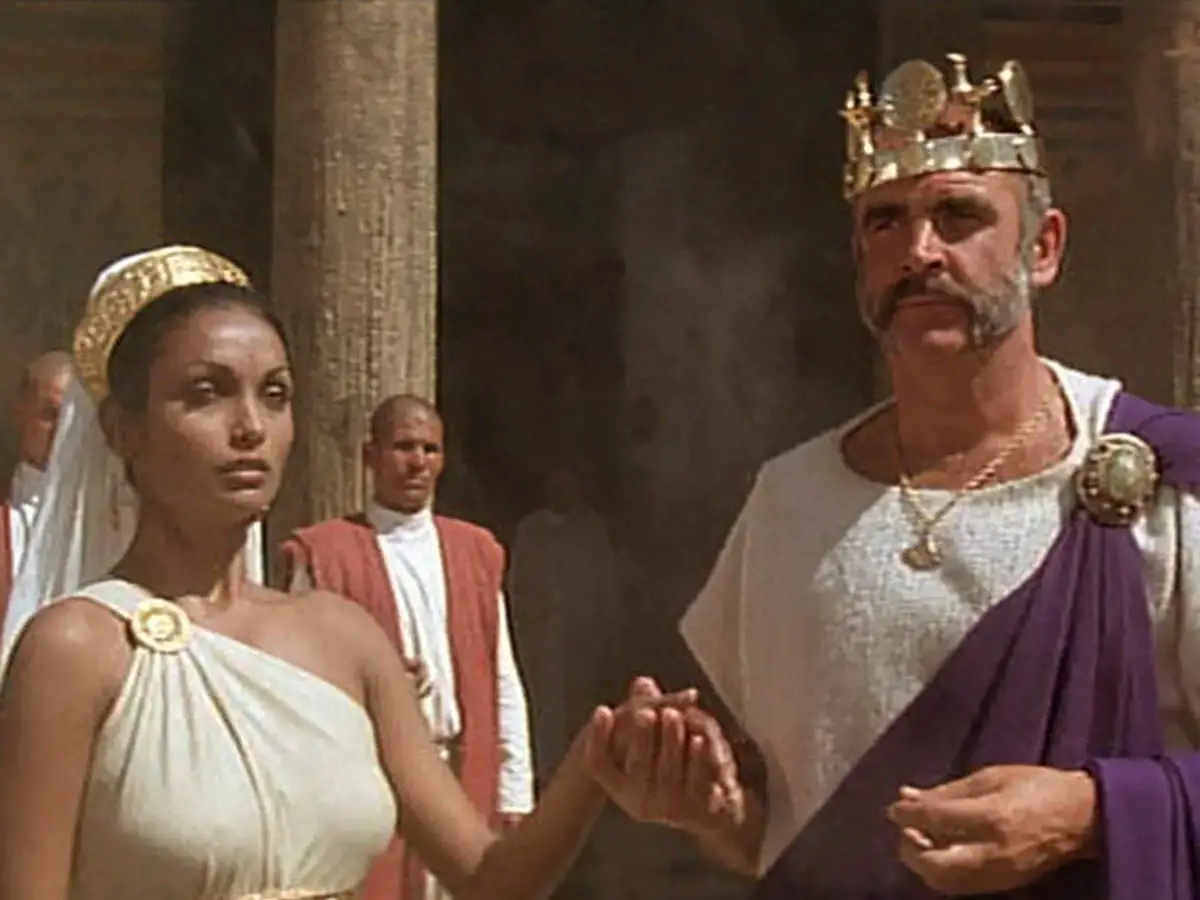
Roxanne does turn out to be Danny’s downfall, but the friendship suffers first. It’s awful to watch these two fight. You begin to see the discomfort on Peachey’s face when Danny first suggests that Peachey should bow to him like the rest of his subjects do, and Peachey is prepared to go along with it…but Danny’s head goes further and further up his own backside, despite Peachey’s pleas to cut and run as they had planned. Danny has big plans for this great nation of his, and they do include eventually going back home—but to stand before the Queen of England, as an equal. Now he wants the Order of the Garter from her, when his Masonic apron should have been enough.
I have to make special mention of a couple of supporting players here. Saeed Jaffrey is just terrific as Billy Fish, a Gurkha foot soldier who came to Kafiristan some years before as part of a scouting party that was never heard from again. Billy Fish survived, and a good thing too, because our heroes (not to mention we, the audience) need an interpreter. Not only that, but he proves as loyal to them as any Brother in the Craft, and fights beside them to the bitter end.
Karroom Ben Bouih was a local drafted by Huston himself to play High Priest Khafu Salim. According to the DVD documentary, he was over 100 years old, and had never been anything resembling an actor before. He does a great job, and now he’s immortal.
Remember that last part of the Contrack? That part that didn’t need to be said, but just sounded nice? But for that last, Peachey at least might have gotten out of this alive. When Danny asks Peachey to stay for his wedding for old times’ sake, Peachey begs his friend one last time to come back with him. Danny says no. Roxanne isn’t having any of it, though, and she bites Danny on the face drawing blood, and proving that Danny is nothing but a mortal man. Whoops.
Sidebar, sort of—I hate Thelma and Louise. Just hate it. I love watching a would-be rapist get shot as much as the next woman, but the ending infuriates me. I think it’s fake feminism at its worst, one friend making stupid choice after stupid choice, and getting her loyal friend killed along with her in the process. That’s a little bit what’s at work in The Man Who Would Be King, in that yes, Peachey is paying the price for Danny’s pigheadedness (though again, leaning into the god thing was initially Peachey’s bright idea), but here, it has the opposite effect on me (it is heartwarming and wonderful, as opposed to making me want to throw things).
That is because nowhere in Thelma and Louise is there an honest owning of responsibility like there is between these two friends. I don’t think it’s because men are better at this, or that they make apologies or communication simpler, though I know some who might disagree. “Peachey, I’m heartily ashamed of getting you killed instead of going home rich like you deserved, on account of me being so bleeding high and bloody mighty. Can you forgive me?” “That I can, and that I do, Danny. Free and full, and without let or hindrance.” “Everything’s all right, then.” And Daniel Dravot walks calmly to his execution.
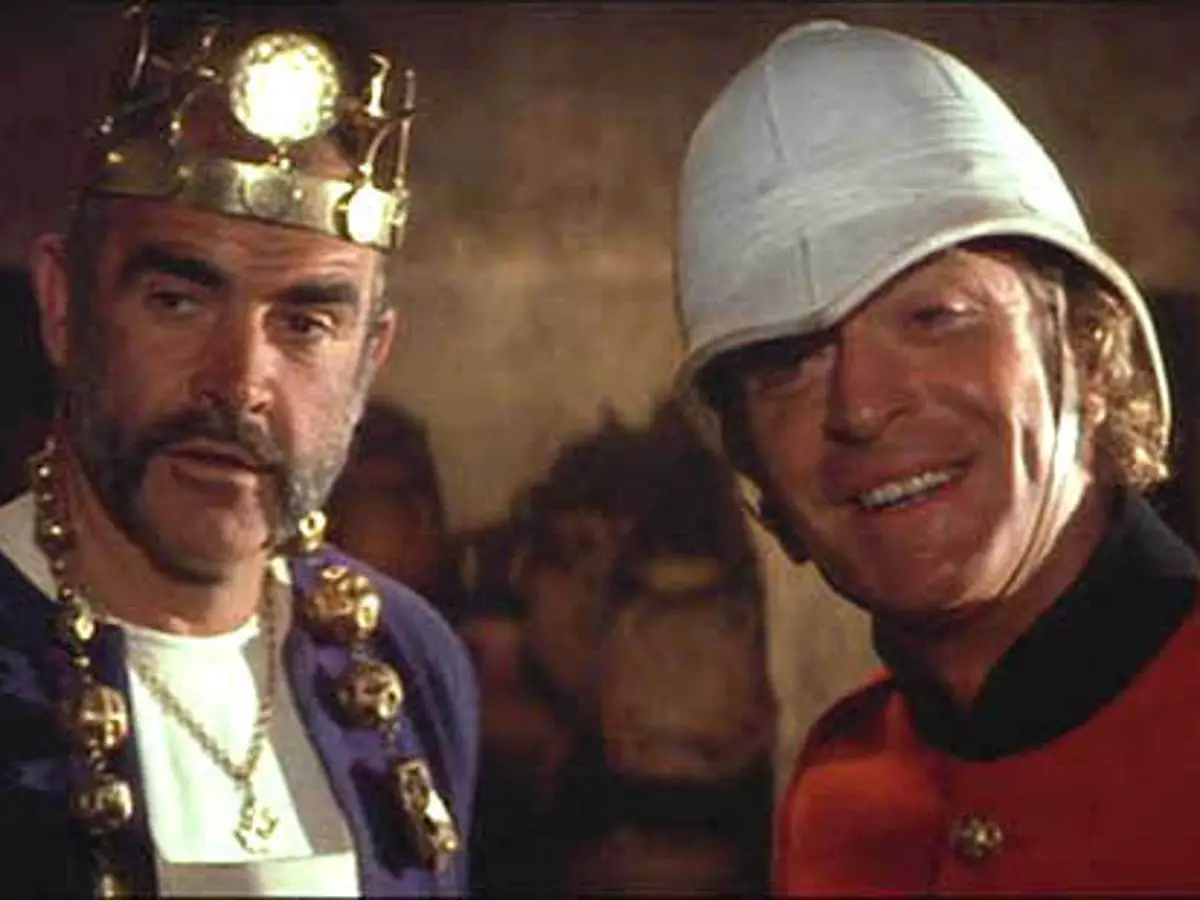
During the months when they were waiting for the winter storms to clear enough so they could get home again (taking with them all the riches Alexander had left stockpiled in his holy city), Peachey had passed the time building a rope bridge across a great chasm, to unite two more tribes (I’m telling you, these two were really good at this). It is to the middle of this bridge that they drive Danny, to stand while his angry subjects hack at the ropes. This is where we get the payoff for the “if a king can’t sing” setup. Danny sings “The Son of God Goes Forth To War” as he stands there. Peachey sings it with him, and when he falls before he is able to finish the verse, Peachey finishes it for him.
The tale ends back in Kipling’s office. It isn’t stated, but I think his return is Peachey’s last fulfillment of the Contrack. He needs to come back to the place it began, and have the three of them there, together, insofar as he can, and have Brother Kipling bear witness again. And he needs to stay by Danny to the end, as Danny did for him (since, as he says, he was quite safe on his travels home, because Daniel never let go of Peachey’s hand). In the novella, Peachey dies soon after in an asylum, and in the film, he is clearly hanging on to his last shreds of sanity. He leaves a bundle on Kipling’s desk and shuffles away, saying he has to meet a man at Marwar Junction. Kipling unwraps the bundle to reveal Danny’s head, with his golden crown still on, and it is dignified and discreet (as stated in the Contrack), and a symbol of a friendship that was the stuff of legend.

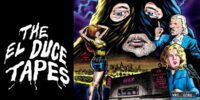
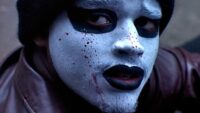

I have to leave a PS here – I only just finished reading The Boys graphic novels (I know, I’m late to every party), and it absolutely SHREDDED me that, right before heading out to the events leading up to the climax in the last book, Billy Butcher is watching a movie on his laptop, and for those able to identify it by the single line “not gods, Englishmen. Which is the next best thing,” he is watching this. Garth Ennis doesn’t give you more than the one line, so you either get it or you don’t (I love those), but it is SUCH a Billy Butcher movie, and though you don’t know it yet, kind of appropriate for what is to come. Thanks for that extra twist of the knife there, Garth.